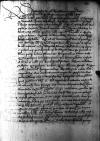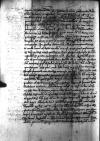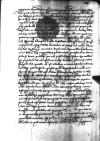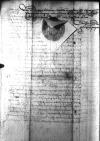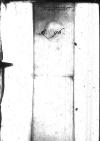Quae ad nos transsumpta iurium et privilegiorum ⌊civitatis nostrae Gedanensis⌋ super bona nostra Pucensia Sinceritas et Fidelitates, ac Devotio Vestrae miserunt, ea legi diligenter fecimus. Neque aliud in eis reperiri potuit, nisi quod inscripta eis et obligata bona haec fuerint in summa quinque milium florenorum Hungaricalium anno millesimo quadringentesimo nonagesimo primo per divum parentem nostrum et iterum in mille per serenissimum fratrem ⌊Alexandrum⌋ anno millesimo quingentesimo secundo. Quam summam, hoc est, sex milia florenorum Hungaricalium illis deberi, si modo litteris originalibus idem comprobaverint, negari non potest. Nullas praeterea summas alias in bonis istis nostris inscriptas videmus. Nam quas producunt litteras C littera signatas, eae videntur eiusmodi, ut non modo bona Pucensia, sed et omne id, quod ordinis tempore commendator Gedanensis possedit, nempe molendina, exactio telonei Pfundczoll dicti ac civitates villaeque omnes, quas eum habuisse constat, pleno iure iam ad nos redisse videatur, nulla etiam pecuniarum summa per nos persoluta.
Cum enim diserte scriptum in iis litteris habeatur, quod ipsi commendatoriam Gedanensem et officium magistri piscatoris quondam ad ⌊Puczk⌋ pertinens ac villam Leibe cum omnibus ipsorum civitatibus, villis, censibus, fructibus teneant usque ad summae pecuniarum, quas stipendiariis in ⌊Stargarth⌋, in ⌊Nowe⌋ et aliis locis impenderunt, perceptionem et extenuationem, qua habita et summa extenuata dicta commendatoria et officium magistri piscatoris ad nos revertetur pleno iure, facile coniecturam ex eo facere licet, quandoquidem isti proventus commendatoriae et magistri piscatoris uberes sunt, et eos nonaginta prope iam annis perceperunt, etiamsi, quod asserere dicuntur, ducenta milia florenorum eis debita fuissent, quod tamen non credimus non percepisse modo eos iam summam istam intra tempus tam longum, sed etiam in pari et maiori summa debitores nobis remansisse.
In quibus tamen litteris illud animadvertimus, si modo earum in data erratum non est, quod sunt posteriores iis litteris, quibus cives, quibus ea bona primum inscripta fuerunt, cesserunt eis praeter consensum nostrum ⌊civitati Gedanensi⌋ pecunia, in qua impignorata bona fuerunt, ab ea accepta. Quattuor enim mensibus post id factum est, quam sunt illae Latinae litterae datae. Quae quo tempore datae sunt, certi illi cives in possessione bonorum Puczko fuerunt, non civitas universa, cui cessio nondum facta erat. Sed quicquid hic residet scrupuli, facile dissolvent litterae originales, aut saltem litterae, quas habent super commendatoriam, quas et ipsas produci ab eis volumus. Quibus exhibitis omnis erit procul dubio dubitatio sublata.
Committimus itaque Sinceritati et Fidelitatibus ac Devotioni Vestris, ut, quo loco et tempore visum illis fuerit, vocent iterum ad se consules Gedanenses, et eis auctoritate nostra regia mandent, ut cum originalibus litteris suis, non modo super bona nostra Pucensia, sed etiam super commendatoriae proventus, quos possident, coram vobis compareant. Quibus vos, si originales litteras produxerint, et idem in illis, quod in transsumptis, continebitur, de fisco nostro numerari per generosum ⌊Stanislaum Costka de Stenbergk⌋ castellanum Elbingensem, et capitaneum Golubensem ac ⌊terrarum nostrarum Prussiae⌋ thesaurarium, sex milia florenorum Hungaricalium decernetis, ac eidem nostro nomine possessionem bonorum Pucensium semota quavis cunctatione assignabitis.
Nam quod volunt ⌊Gedanenses⌋ uno anno ante se certiores de redemptione fieri debere, quod, cum tribus illis civibus primum oppignorata fuissent, haec in litteris eorum clausula est praescripta, non videmus, quo iure praerogativa solis tribus illis concessa gaudere possint, cum nullas ipsi suas producant litteras, in quibus haec eadem clausula sit perscripta, atque adeo ne id quidem doceant nos in cessionem a tribus illis civibus civitati faciendum aliquando consensisse.
Si vero, quod non putamus, originales litteras non produxerint, nihilominus nostro nomine eidem generoso ⌊Stanislao Costka⌋ castellano Elbingensi bonorum Puczko possessionem assignabitis, ita tamen, ut prius nostro nomine idonee civitati Gedanensi caveatur de solutione sex milium praedictorum, cum ea deberi litteris originalibus probaverint, protestatione tamen facta, si doceri quandoque per nos possit summam istam sex milium esse persolutam, ut eam restituere nobis teneantur, florenos autem Hungaricales, quando non est adiectum „in auro”, usuales volumus intellegi per triginta grossos iuxta regni statutum, mille vero florenos Hungaricales iusti et boni ponderis cum scribitur in aliis litteris, etsi nec ibi additum est „in auro”, tamen, quoniam pondus adiectum est, in auro volumus numerari.
Quae omnia ante comitia proxima Graudentina ita per Sinceritatem et Fidelitates ac Devotionem Vestras confici volumus, unius vestrum absentia non obstante, non attentis quibusvis eorum diffugiis et frivolis exceptionibus aut appellationibus, quibus non obstantibus possessionem bonorum nostrorum Pucensium capiant aut capi faciant per eos, per quos de more possessio capi consuevit. Quod nisi statim eorum possessione cesserint, tum auctoritate nostra regia poenam decem milium florenorum contra eos decernent irremissibiliter ab eis exigendorum. Si qua vero in re se gravatos putaverint, nos de eo cognoscemus ac ne quam sibi iniuriam esse factam iure queri possint, providebimus, dummodo ne quid morae afferatur adeundae nostro nomine possessioni.
